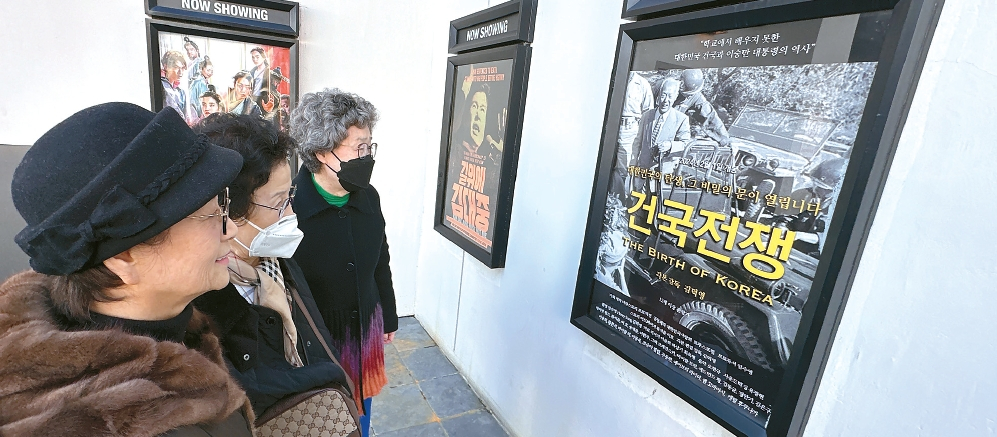Southern California’s Korean-American theaters are currently experiencing a surge in political films centered on Korean history.
This popularity masks an underlying conflict of political ideologies. CGV LA and Buena Park have recently launched a series of political films on Korea’s modern history, such as ‘The Birth of Korea’, ‘Kim Dae Jung on the Road’, and ‘12.12: The Day’, marking an unusual simultaneous release of multiple political movies.
The documentary ‘The Birth of Korea’, highlighting Syngman Rhee’s life, as the first president of Korea, has become a hit, selling out in theaters across the U.S. among Korean Americans.

CGV reports that since its Southern California premiere on February 16, the film has sold out at every screening. On February 20, the Korea National Elders Council U.S. West Chapter invited 80 elders from diverse backgrounds to a screening at CGV LA.
Man-kyu Choi, the organization’s secretary-general, remarked, “The movie taught us many historical facts about former President Syngman Rhee that we hadn’t properly learned before.” “Most audience members gave a standing ovation after the movie, and many were moved to tears,” he added.
When The Korea Daily reached out to CGV LA on February 21, tickets for the day had already sold out. In front of the theater, dozens of Korean Americans were seen expressing disappointment that they were unable to get tickets though it was a weekday.
“I couldn’t get tickets online, so I came to the theater just in case, but it was also sold out,” said LA resident Junggyun Lee, 59. “There are plenty of tickets left for other political movies, but they’re not the ones that I want to see,” he said.
Currently, social media is flooded with posts sharing photos and reviews of the movie experience. It’s more than just an indication of having seen the movie, but also a kind of ‘coming out’ of political ideology.
“When I posted a photo of my ticket to The Birth of Korea on Facebook, some people unfriended me and some even argued with me about it,” said Younghoon Jin, 37, of Irvine. “I don’t understand why they feel uncomfortable when they also see a movie with a different political orientation than this and post a photo of their own.”
This year’s films are deeply political and ideologically polarized, with conservatives and liberals showing preferences for different titles.
The audience for ‘12.12: The Day,’ detailing the 1979 military coup led by Major General Doohwan Chun, and ‘Kim Dae Jung on the Road,’ chronicling the life of former President Daejung Kim, likely diverges from the conservative viewers of ‘The Birth of Korea.’ Notably, ‘12.12: The Day’ saw packed theaters in Los Angeles upon its release last December, indicating substantial interest.
Sunyoung Moon, CEO of Wisecalifornia and a noted financial expert and cultural critic, facilitated four screenings of ‘12.12: The Day’ at CGV LA, inviting more than 600 Korean viewers.
Moon remarked, “I chose not to watch ‘The Birth of Korea,’ acknowledging that people hold political biases. Currently, we’re witnessing an ideological battle, a reflection of societal instability, manifested through cinema.”
The divided interpretations of the movie further highlight the sharp ideological divide.
Chulwoong Park, chairman of the Ilsahwae, an organization of former and current Peaceful Unification Advisors, positively evaluated the movie, saying, “‘The Birth of Korea’ is a milestone in establishing Korean history.” On the other hand, UCLA professor Sung-deuk Oak said in a post on social media, “Too much glorification of Syngman Rhee is dangerous,” and pointed out that “it is excessive mythologizing of Syngman Rhee.”
Sungwon Kim, CEO of educational content producer Ground C, critiqued ‘12.12: The Day,’ stating, “The film contains much fiction, captivating audiences emotionally. It serves as propaganda, distorting the facts.”
In Korea, the movie ‘The Birth of Korea’ has accumulated more than 790,000 audiences. Recently, famous singer Naul posted a poster of the movie on his social media, which was met with such backlash that he closed the comment.
BY YEOL JANG, HOONSIK WOO [jang.yeol@koreadaily.com]



![Green card interviews used as decoy for ICE arrests U.S. Immigration and Customs Enforcement (ICE) agents arrest a man after a hearing at an immigration court in Manhattan, New York, on Oct. 27. [REUTERS]](https://www.koreadailyus.com/wp-content/uploads/2025/12/1226-ICE-100x70.jpg)
